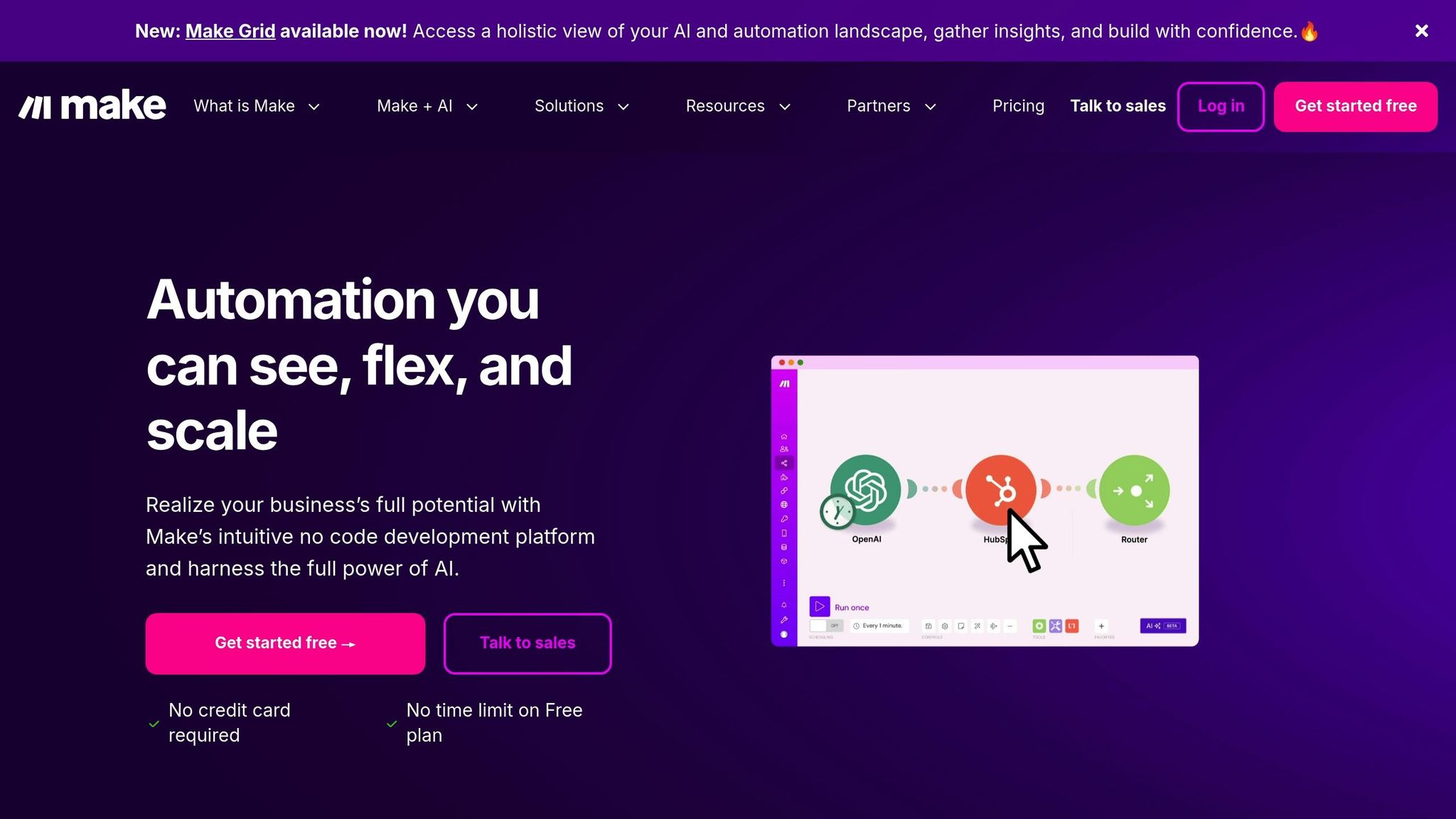AI-driven lead scoring is transforming how businesses prioritize and convert leads. By analyzing customer behavior, historical data, and real-time interactions, AI assigns dynamic scores to prospects, helping sales teams focus on the most promising opportunities. This approach is faster, more accurate, and cost-effective compared to manual methods.
Key Takeaways:
- Accuracy: AI achieves 85–95% success in lead scoring, compared to 60–75% with manual methods.
- Efficiency: AI processes thousands of leads instantly, while manual scoring handles only 20–30 leads per person daily.
- Cost Savings: Over three years, AI systems cost $36,000–$180,000 versus $540,000–$900,000 for manual processes.
- Conversion Boost: Companies using AI report a 25% increase in conversion rates and a 30% reduction in sales cycle time.
- Personalization: AI tailors outreach based on customer behavior, improving engagement and retention.
Why It Matters:
AI eliminates inefficiencies in lead qualification, reduces errors, and provides actionable insights. Businesses using AI-powered CRM tools see higher productivity, faster sales cycles, and better customer satisfaction. With 88% of sales leaders expecting more AI integration by 2025, adopting AI for lead scoring is no longer optional – it’s critical for staying competitive.
How to build an AI Lead Scoring System in 19 MIN! | Make.com | ChatGPT | Tally | FULL TUTORIAL

Key Benefits of AI Lead Scoring with CRM
Integrating AI lead scoring into CRM systems is reshaping sales strategies, making teams more efficient and productive. By leveraging advanced algorithms, businesses can prioritize leads, personalize outreach, and stay ahead in competitive markets.
Smarter Lead Prioritization and Enhanced Sales Efficiency
AI algorithms analyze customer data in real time, assigning scores to leads based on their likelihood to convert. This automated ranking lets sales teams zero in on high-potential prospects, saving time and resources. Companies using AI-driven lead scoring report a 22% boost in conversion rates and a 25% reduction in sales cycle time.
The efficiency gains are striking. Top-performing sales teams spend 43% of their time engaging with customers, while average teams spend just 21% on selling activities. Additionally, businesses that incorporate AI into their CRM systems see a 50% increase in lead generation and reduce lead qualification time by 60%. In fast-paced industries, this speed can make the difference between winning or losing a deal.
AI dives deep into demographic, behavioral, and firmographic data, uncovering patterns that predict conversion potential. By processing thousands of interactions, it identifies success trends that might otherwise go unnoticed. Currently, 70% of sales operations professionals use AI for real-time selling insights, and 88% of sales leaders anticipate further AI integration into CRM processes within the next two years.
"We’re turning tribal knowledge into a scalable playbook… Instead of hoping sellers figure it out through trial and error, we can give them a proven roadmap from day one." – Michael, Ebsta
This streamlined approach allows teams to craft more personalized and effective strategies.
Boosting Conversion Rates with Personalization
AI elevates sales efforts by transforming generic outreach into highly tailored interactions. By analyzing customer behavior, preferences, and past interactions, AI pinpoints what each lead needs and when they need it. It monitors behaviors like email opens, website visits, and social media activity to measure genuine interest.
AI-driven lead scoring can increase sales by 25%. For example, Salesforce‘s Einstein AI analyzes customer data to offer personalized recommendations, predicting behavior and enhancing engagement for one retail client. By building detailed customer profiles, sales teams can craft messages that resonate with individual leads at every stage of their journey.
Companies using AI-powered CRM tools report up to a 30% jump in sales productivity. This improvement stems from delivering the right message at the right time, while also fostering stronger customer relationships and encouraging repeat business.
"AI has redefined what’s possible in CRM personalization. Brands that adopt AI across the customer journey can create richer, more relevant, and more resilient relationships." – Austin Wright, Head of Strategy & Analytics, Tandem Theory
These personalization efforts are continuously refined to ensure they remain effective.
Continuous Learning for Better Predictions
Unlike static systems, AI lead scoring models evolve over time. As more data flows in, the algorithms refine their predictions, adapting to changes in customer behavior and market conditions. This dynamic process ensures scoring criteria stay relevant and effective.
Businesses using AI-powered lead scoring see a 30–40% boost in lead conversion rates due to improved accuracy. The system’s ability to spot emerging trends and adjust its algorithms keeps sales teams ahead of the curve. Looking ahead, 60% of B2B marketers plan to implement AI-powered lead scoring tools by 2025, highlighting the growing demand for these adaptive systems.
AI systems rely on supervised learning, training on historical data to identify patterns and relationships. As new data comes in, the system updates lead scores in real time, giving sales teams the most accurate and actionable insights. This is especially valuable in fast-changing markets where customer preferences can shift quickly.
Businesses adopting AI-powered CRM report a 15% increase in repeat sales and customer retention, with 46% experiencing revenue growth through AI integration. These benefits grow over time as the AI system becomes more precise in its predictions and recommendations.
To maintain accuracy, sales and marketing teams should regularly review and refine the AI model. Periodic updates and feedback loops ensure the system continues to deliver meaningful results as business needs evolve. This ongoing learning process is key to maximizing the impact of AI on CRM strategies.
How AI Lead Scoring Works in CRM Systems
AI has revolutionized how businesses prioritize leads and personalize customer interactions. By turning raw customer data into actionable insights, AI plays a key role in modern sales strategies. With advanced algorithms and real-time data analysis, it creates a scoring system that evolves and improves over time. Let’s dive into how this process works, how it integrates with CRM systems, and how to address common challenges.
Core Methods of AI Lead Scoring
AI lead scoring uses machine learning algorithms to predict which leads are most likely to convert. These systems pull data from various sources like CRMs, marketing tools, website activity, email campaigns, and social media. After cleaning and organizing the data, the algorithms analyze it to create actionable metrics.
Trained on historical data, these models assign scores based on patterns of past conversions. As new data flows in, the system refines its predictions, making it more accurate over time. This approach reduces human error and ensures that new leads matching successful profiles are prioritized.
"AI algorithms can process complex datasets to identify patterns that may not be apparent through manual analysis, leading to more precise lead scoring." – Lead Generation World
Connecting AI Tools with CRM Systems
Integrating AI tools into CRM systems takes lead management to the next level. By embedding real-time lead scores directly into the CRM interface, sales teams can access up-to-date information without switching platforms. However, before integration, it’s crucial to audit CRM data for accuracy and completeness.
Once integrated, AI tools automatically update lead scores as prospects engage across different channels. Tailoring AI models with historical data ensures the scoring aligns with the company’s specific sales processes. Businesses that adopt this approach often see improved workflow efficiency and better sales forecasting. In fact, 63% of companies now use AI-powered CRM solutions, and AI lead scoring adoption has grown by 30% in the past year.
Solving Common Implementation Problems
While AI lead scoring offers many advantages, its implementation can present challenges. One critical factor is maintaining high-quality data. Regular audits and data enrichment practices are essential to ensure the accuracy of lead scores.
Another hurdle is system integration, especially with outdated or fragmented platforms. Choosing scalable tools that easily connect with existing CRMs – or using middleware solutions – can help overcome these obstacles. Additionally, many organizations lack in-house expertise for AI modeling. This gap can be filled by using vendor-provided models or working with specialized data consultants.
It’s also vital to keep AI models up to date. Continuous learning loops allow models to adapt to changing market conditions, ensuring their predictions remain relevant. Beyond technical challenges, issues like skills shortages and resistance to change can slow AI adoption. In fact, 42% of organizations cite insufficient talent as a major barrier. Addressing these issues requires targeted training, fostering a culture of innovation, and ensuring robust integration processes. Regular monitoring and refinement are key to sustaining long-term success.
sbb-itb-d6d4d8b
Best Practices for AI Lead Scoring in CRM Systems
Getting AI lead scoring right takes thoughtful planning, solid data management, and ongoing fine-tuning. By following proven strategies, businesses can make the most of their investment and see measurable results.
Checking Readiness and Setting Goals
Before jumping into AI lead scoring, it’s important to evaluate your current systems and set clear objectives. Start with a detailed review of your existing lead scoring process to identify its strengths, weaknesses, and areas where AI can make the biggest difference. Make sure your CRM data is accurate and up to date, as this will directly impact the AI’s performance.
Involve both sales and marketing teams in this evaluation. Their hands-on experience can pinpoint issues in the current system and identify missed opportunities.
When choosing an AI platform, prioritize features like flexibility in data inputs, machine learning capabilities, and customization options. Request demos or trials to see how the tool handles your data and whether it provides actionable insights. Platforms with explainable AI are worth considering, as they clarify how scoring decisions are made, building trust in the system.
Being prepared as an organization is just as crucial. According to McKinsey‘s B2B Pulse Survey, 19% of B2B decision-makers are already using AI, and another 23% are in the process of adopting it. However, with 80% of AI projects failing to meet expectations and only 30% moving past the pilot stage, thorough preparation and realistic goal-setting are essential.
Once goals are clearly defined, the focus shifts to ensuring data quality and fostering collaboration across teams.
Maintaining Data Quality and Team Collaboration
The success of AI lead scoring hinges on high-quality data. Companies that embrace data-driven marketing see a 24% boost in conversion rates, but 60% of marketers struggle with data quality issues, which can undermine confidence in their scoring systems.
To address this, set clear data standards and perform regular audits to ensure accuracy. Standardizing data across systems and using integration tools to sync information can prevent fragmented data that might skew AI predictions.
With strong data practices in place, collaboration between departments becomes critical. Regular meetings between sales, marketing, and IT teams help ensure that insights from day-to-day operations refine the AI models. Sales teams can share feedback on lead quality, marketing can contribute behavioral and engagement data, and IT can manage system integration and technical support.
It’s also essential to handle customer data responsibly. Obtain clear consent for data collection, maintain transparency about how data is used, and implement robust security measures to protect sensitive information. Regularly review and update your data policies to stay compliant with regulations like GDPR and CCPA.
A good example of this approach is Salesforce, which has shown how prioritizing data quality can enhance AI lead scoring. By consistently cleaning and updating its customer databases, Salesforce improved the accuracy of its AI-driven predictions.
Testing and Improving AI Models
Once you’ve established a strong foundation with quality data and team collaboration, focus on continuously testing and refining your AI models. AI lead scoring isn’t a one-and-done process – it requires ongoing monitoring and adjustments to stay aligned with sales goals and evolving buyer behavior.
Track key metrics like conversion rates and sales velocity to measure how well the model is performing. Sales team feedback is invaluable here, as it ensures the model reflects what’s happening in the real world.
Use A/B testing to optimize algorithms and improve conversion rates. Experiment with different scoring thresholds to find the best timing for sales outreach. Regularly retrain your models to account for new trends in buyer behavior.
Hold cross-department reviews to refine performance further. These discussions can uncover insights that data alone might miss, such as seasonal trends or industry-specific patterns.
For instance, HubSpot’s use of AI-driven lead scoring led to a 25% increase in qualified leads and a 15% reduction in sales cycle time. Adjusting lead scoring thresholds based on actual conversion data can help ensure the model accurately distinguishes between high- and low-quality leads.
Measurable Results and Business Impact
Integrating AI-powered lead scoring into CRM systems is proving to be a game-changer for businesses, delivering noticeable boosts in sales performance, operational efficiency, and customer satisfaction. What was once considered an optional tool is now becoming essential to stay ahead in a competitive market.
Boosting Sales Productivity and Conversion Rates
AI’s role in improving lead scoring is clear, with tangible results to back it up. Companies using AI-powered sales tools report significant gains. For instance, Salesforce found that businesses leveraging AI saw a 25% increase in sales productivity. Similarly, Microsoft experienced the same 25% boost after adopting predictive lead scoring.
The adoption of AI in sales is growing rapidly: 61% of companies already use AI to enhance their sales processes, and 79% of sales teams see AI-powered CRM as critical to their success. However, only 23% of sales teams are fully utilizing AI’s potential. Honeywell provides a compelling example, where implementing AI-driven lead scoring increased conversion rates by 25% and cut lead qualification time by 30%. On top of that, businesses investing in AI-powered tools report an average 15:1 return on investment.
Accelerating Sales Cycles and Improving Customer Satisfaction
AI doesn’t just help close more deals – it helps close them faster. By integrating AI into CRM systems, businesses have reduced sales cycle lengths by 30% and increased sales productivity by 20%. IBM, for example, achieved a 30% reduction in sales cycle time by using AI to focus on high-quality leads.
Efficiency gains extend beyond lead scoring. Companies using AI-powered CRM tools have cut time spent on data entry and analysis by 40%, saving teams up to 30% on operational costs. These time savings translate into better customer interactions, with faster responses and more personalized experiences. The result? A 25% increase in sales driven by improved customer satisfaction.
Real-World Success Stories
The transformative power of AI in lead scoring is evident in real-world examples:
- HubSpot adopted an AI-powered scoring model that used firmographic, behavioral, and intent data, leading to a 43% increase in qualified opportunities.
- Sephora utilized predictive scoring to analyze customer behavior and purchase history, achieving a 25% boost in customer lifetime value, a 30% improvement in retention, and a 15% increase in sales.
- Grammarly saw an 80% rise in plan upgrades through its AI-driven Account Engagement system, which scores leads based on engagement and user count.
"We’ve increased our conversion rates between marketing and sales leads, and it’s really built trust between the two teams." – Kelli Meador, Senior Marketing Operations Manager, Grammarly
- Generali reduced its sales cycle length by 20% through cross-channel lead scoring.
- A mid-market SaaS firm specializing in enterprise workflow automation combined Salesforce CRM with AI tools, achieving a 30% shorter sales cycle, a 45% increase in lead-to-opportunity conversions, and a 35% boost in marketing ROI.
- Warby Parker implemented HubSpot’s AI CRM platform, resulting in a 45% increase in conversion rates and notable improvements in customer satisfaction.
These examples highlight how businesses across industries and sizes are leveraging AI-powered CRM tools to achieve measurable success. On a broader scale, companies using AI-driven lead scoring report revenue increases of 15–20%, while AI-powered marketing strategies contribute to a 10–15% revenue boost. The predictive lead scoring market is also forecasted to grow from $1.4 billion in 2020 to $5.6 billion by 2025.
For expert guidance on implementing AI-driven marketing systems, visit JeffLizik.com.
Conclusion: AI’s Impact on CRM Lead Scoring
AI is reshaping the way businesses approach lead scoring, fundamentally changing how sales and marketing teams work together. The days of relying on static, manual processes are giving way to data-driven systems that adapt in real-time and deliver measurable results across various industries.
Studies show that AI-powered lead scoring systems can achieve an impressive 85–90% accuracy in predicting conversions. This precision directly impacts business performance, with companies reporting 20–30% increases in conversion rates and up to a 30% rise in sales productivity. These numbers highlight AI’s ability to drive tangible outcomes.
What sets AI apart is its capability to analyze massive datasets and reveal hidden patterns in customer behavior. Unlike traditional methods that rely on basic criteria like job title or company size, AI evaluates dozens of variables simultaneously. It adapts to shifts in market trends and buyer behaviors in real time, offering insights that manual methods simply can’t match.
"AI turns your CRM from a liability into a live source of truth – without adding to rep workload." – Zipteams
AI also brings objectivity to the table, reducing bias and making lead prioritization more reliable. By delivering insights backed by data, it enables sales and marketing teams to focus on high-potential leads and allocate resources more effectively.
However, success with AI requires preparation. Clean, high-quality data is non-negotiable – no matter how advanced the AI model, its predictions are only as good as the data it processes. Choosing platforms with explainable AI can also help teams understand and trust the system’s recommendations.
The adoption of AI in CRM is accelerating. Seventy-five percent of companies using AI-powered CRM tools report increased sales productivity, and the global market for AI in CRM is expected to reach $48.4 billion by 2033. Businesses that hesitate risk falling behind competitors already capitalizing on these tools.
For expert advice and tailored strategies to integrate AI into your marketing systems, visit JeffLizik.com for consulting services and resources designed to align with your business goals.
FAQs
How does AI make lead scoring more accurate and efficient in CRM systems?
AI has transformed lead scoring by boosting accuracy to over 85%, a significant jump from the 50-60% range commonly seen with older methods. It achieves this by processing massive datasets, spotting patterns, and predicting which leads are most likely to turn into customers.
Beyond accuracy, AI also ramps up efficiency by automating routine tasks and cutting down on human bias, which can lower errors by as much as 30%. This means businesses can quickly focus on high-value leads and use their resources more strategically, leading to stronger outcomes overall.
What challenges do businesses face when using AI for lead scoring in CRM systems?
Implementing AI-driven lead scoring in CRM systems isn’t without its hurdles. One of the biggest challenges is data quality – AI models need accurate, well-organized data to produce reliable results. If the data is messy or incomplete, the system’s performance will suffer.
Another common obstacle is the technical complexity of integrating AI tools into existing CRM platforms. This process often demands significant time, effort, and resources, which can strain teams and budgets.
Then there’s the lack of in-house expertise. Many businesses don’t have the technical skills on hand to manage and refine AI systems effectively. On top of that, companies often face employee resistance to adopting new technologies, as some team members may be wary of change or unsure about how AI will impact their roles.
Tackling these challenges head-on can make the implementation process smoother and set the stage for better results in the long run.
How can businesses keep their AI models for lead scoring accurate and effective over time?
To keep AI models for lead scoring accurate and effective, businesses need to update them consistently with fresh, high-quality data. Regular testing and validation are crucial to ensure the predictions match actual outcomes. Beyond that, gathering feedback from sales teams and reviewing performance metrics can fine-tune the model, boosting its ability to predict effectively. By continuously refining the model, businesses can ensure it stays aligned with evolving trends and customer behaviors, making lead scoring both dependable and actionable.








